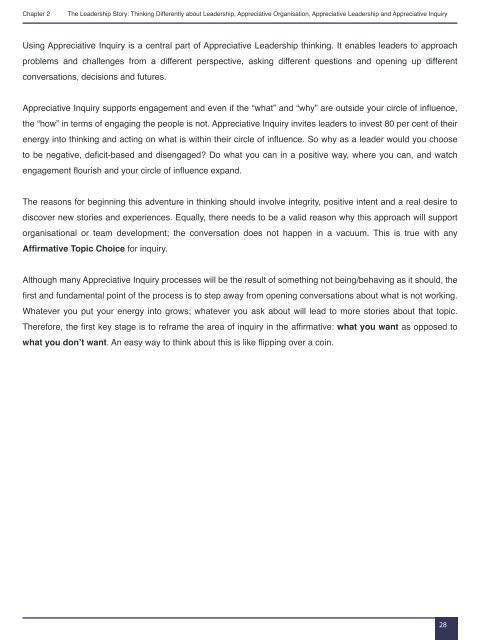Appreciative-Leadership
Appreciative-Leadership
Appreciative-Leadership
Create successful ePaper yourself
Turn your PDF publications into a flip-book with our unique Google optimized e-Paper software.
Chapter 2<br />
The <strong>Leadership</strong> Story: Thinking Differently about <strong>Leadership</strong>, <strong>Appreciative</strong> Organisation, <strong>Appreciative</strong> <strong>Leadership</strong> and <strong>Appreciative</strong> Inquiry<br />
Using <strong>Appreciative</strong> Inquiry is a central part of <strong>Appreciative</strong> <strong>Leadership</strong> thinking. It enables leaders to approach<br />
problems and challenges from a different perspective, asking different questions and opening up different<br />
conversations, decisions and futures.<br />
<strong>Appreciative</strong> Inquiry supports engagement and even if the “what” and “why” are outside your circle of influence,<br />
the “how” in terms of engaging the people is not. <strong>Appreciative</strong> Inquiry invites leaders to invest 80 per cent of their<br />
energy into thinking and acting on what is within their circle of influence. So why as a leader would you choose<br />
to be negative, deficit-based and disengaged Do what you can in a positive way, where you can, and watch<br />
engagement flourish and your circle of influence expand.<br />
The reasons for beginning this adventure in thinking should involve integrity, positive intent and a real desire to<br />
discover new stories and experiences. Equally, there needs to be a valid reason why this approach will support<br />
organisational or team development; the conversation does not happen in a vacuum. This is true with any<br />
Affirmative Topic Choice for inquiry.<br />
Although many <strong>Appreciative</strong> Inquiry processes will be the result of something not being/behaving as it should, the<br />
first and fundamental point of the process is to step away from opening conversations about what is not working.<br />
Whatever you put your energy into grows; whatever you ask about will lead to more stories about that topic.<br />
Therefore, the first key stage is to reframe the area of inquiry in the affirmative: what you want as opposed to<br />
what you don’t want. An easy way to think about this is like flipping over a coin.<br />
28


